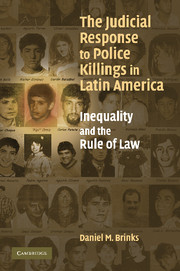Book contents
- Frontmatter
- Contents
- Preface
- 1 Effectiveness and Inequality in the Legal System
- 2 Charting Injustice in Argentina, Brazil, and Uruguay
- 3 Informational and Normative Shifts Across Jurisdictions
- 4 Buenos Aires – Political Interference and Informational Dependence
- 5 São Paulo – Normative Autonomy and Informational Failures
- 6 Uruguay – Strong Results from a Weak System
- 7 Córdoba – High Levels of Inequality in a Strong System
- 8 Salvador da Bahia – Social Cleansing Under Political and Judicial Indifference
- 9 Binding Leviathan
- Appendix: Methods, Case Selection, and Sampling
- References
- Index
2 - Charting Injustice in Argentina, Brazil, and Uruguay
Published online by Cambridge University Press: 07 September 2009
- Frontmatter
- Contents
- Preface
- 1 Effectiveness and Inequality in the Legal System
- 2 Charting Injustice in Argentina, Brazil, and Uruguay
- 3 Informational and Normative Shifts Across Jurisdictions
- 4 Buenos Aires – Political Interference and Informational Dependence
- 5 São Paulo – Normative Autonomy and Informational Failures
- 6 Uruguay – Strong Results from a Weak System
- 7 Córdoba – High Levels of Inequality in a Strong System
- 8 Salvador da Bahia – Social Cleansing Under Political and Judicial Indifference
- 9 Binding Leviathan
- Appendix: Methods, Case Selection, and Sampling
- References
- Index
Summary
In the 1970s the citizens of Argentina, Brazil, and Uruguay were legally powerless when confronting the security forces of authoritarian regimes that had explicitly suspended constitutional guarantees – at that time, demanding a badge number, in the classic expression of the power conferred by a legal right, was not only futile but dangerous. Today, those regimes have been replaced by formally constitutionalist liberal democratic regimes that explicitly guarantee due process and legal redress and forbid police violence and extra-judicial executions. If effective, these formal rights should produce an increase in the power of those who are most likely to be the victims of police violence. There is considerable evidence to suggest, however, that many continue to live in fear of the state and its security forces. Just how effective, then, are citizens' rights in São Paulo? How can we know whether the formal right to be free from arbitrary police violence, in particular, is more firmly rooted in Buenos Aires than in Salvador da Bahia? Whether a shantytown dweller in Córdoba has less effective protection in the courts than a middle-class resident of Buenos Aires? Whether Uruguay's courts back up this right with a more credible threat of prosecution than the courts of Salvador?
This chapter will compare judicial outcomes in the five locations that are the subject of this study. Uruguay has a unitary system and has more or less the population of the smaller cities in my study, so the analysis encompasses the entire country.
- Type
- Chapter
- Information
- The Judicial Response to Police Killings in Latin AmericaInequality and the Rule of Law, pp. 37 - 79Publisher: Cambridge University PressPrint publication year: 2007



